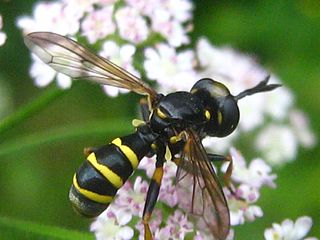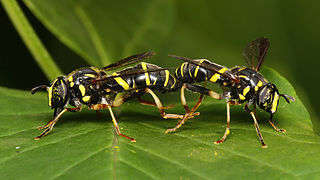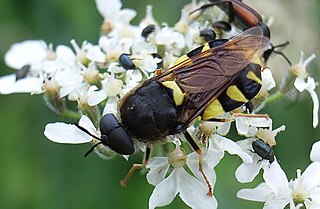
The Conopidae, usually known as the thick-headed flies, are a family of flies within the Brachycera suborder of Diptera, and the sole member of the superfamily Conopoidea. Flies of the family Conopidae are distributed worldwide in all the biogeographic realms except for the poles and many of the Pacific islands. About 800 species in 47 genera are described worldwide, about 70 of which are found in North America. The majority of conopids are black and yellow, or black and white, and often strikingly resemble wasps, bees, or flies of the family Syrphidae, themselves notable bee mimics. A conopid is most frequently found at flowers, feeding on nectar with its proboscis, which is often long.

Xylota is a Holarctic genus of hoverflies similar in structure to the related genera Chalcosyrphus and Brachypalpoides. As the larvae are saprophytic they're usually found in rotting wood. The adult flies are generally associated with woodland and woodland edges and can often be seen running over the upper sides of leaves. Unlike other syrphids the adults of many species rarely visit flowers preferring instead to gather pollen from leaf surfaces. There are over 100 described species of which 12 can be found in Europe. Seven species have been recorded in Britain.

Conops is a genus of flies from the family Conopidae. The larvae of Conops are parasitic on bees, especially bumblebees. Adults feed on nectar.
Asiconops is a subgenus of flies from the genus Conops in the family Conopidae.

Conopini is a tribe of the flies family Conopidae. The larvae of species are parasitic on bees, especially bumblebees. Most adults will feed on nectar.

Spilomyia is a genus of hoverflies. Many species in the genus show Batesian mimicry of wasp models, including black and yellow patterns and modified antenna shape.

Lydina is a genus of flies in the family Tachinidae.

Criorhina is a genus of hoverflies.Medium to large sized species, black or greenish black, with or without light ground markings mimicking bumblebees .The head is much flattened and broader than the thorax. The antennae are situated upon a prominent conical frontal process, The face is moderately produced below the eyes, downward or forward, in profile. The eyes are bare. The abdomen is elliptical or very short oval. .Larvae found in rot holes or decaying hardwoods

Sicus is a genus of flies from the family Conopidae.

Myopa is a genus of flies from the family Conopidae.

Physocephala is a genus of flies from the family Conopidae.

Zodion is a large genus of flies from the family Conopidae.

Stratiomys is a genus of soldier flies in the family Stratiomyidae. There are at least 90 described species in Stratiomys.

Solva is a fly genus in the family Xylomyidae, the "wood soldier flies".

Xylomya is a fly genus in the family Xylomyidae, the "wood soldier flies". There are at least 30 described species in Xylomya.

Acrocera is a genus of small-headed flies in the family Acroceridae. There are around 50 described species in Acrocera.

Ptychoptera is a genus of phantom crane flies in the family Ptychopteridae. There are at least 70 described species in Ptychoptera.
Sintoria is a genus of robber flies. There are about six described species in Sintoria.

Schroederella is a genus of flies in the family Heleomyzidae. There are about 14 described species in Schroederella.
Phyllomyza is a genus of freeloader flies in the family Milichiidae. There are at least 30 described species in Phyllomyza.




















